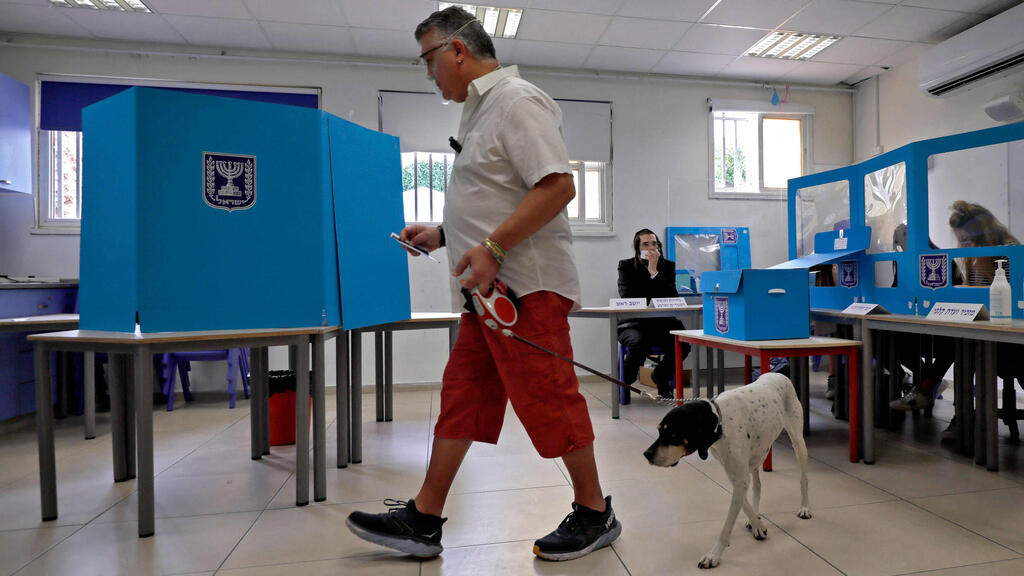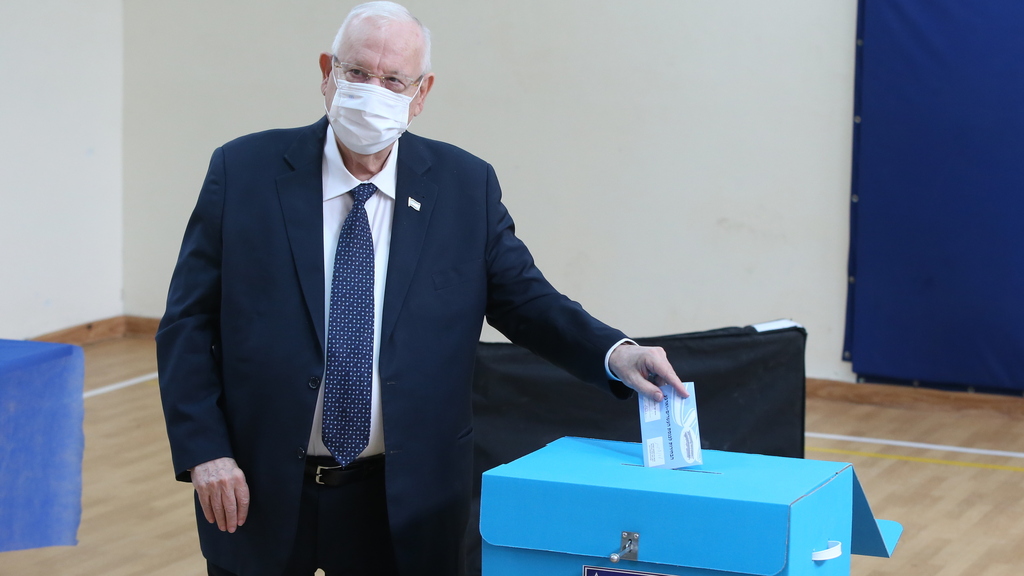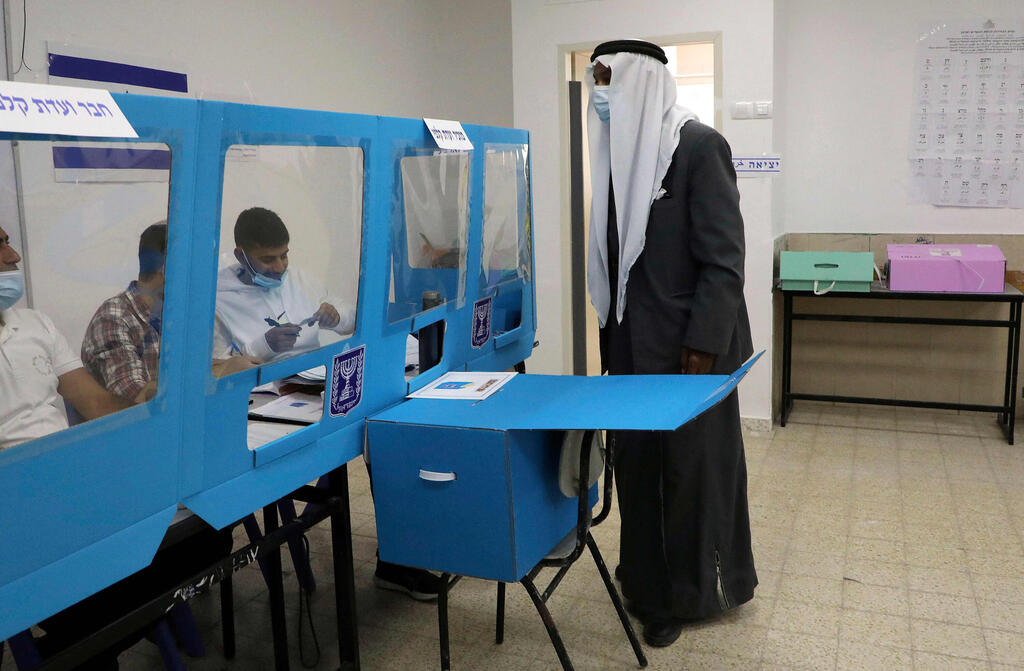It is unclear what the outcome of Tuesday's election will be. Looking at the polls that predict a draw, even a gain of two Knesset seats for one of the blocs would be considered "amazing" and "surprising."
To be precise: blocs in the context of the recent elections means the "just not Bibi" bloc versus the "only Bibi" bloc.
3 View gallery


An Israeli man leads his dog as he casts his ballot at a polling station in Tel Aviv on March 23, 2021
(Photo: AFP)
Even if the bloc that pledges to oust Benjamin Netanyahu is victorious, one thing remains undisputed: this will be one of the most sweeping achievements of the right-wing bloc since the establishment of the state.
This will not happen because the public is moving in droves to the right. After all, according to every serious survey over the last decade, there is a clear majority of Israelis who support centrist positions on resolving the Palestinian conflict or the issue of religion and state.
The data shows that 53% of Israeli Jews support an equality amendment to the Nation State Law and 75% support adding an equality amendment to the Basic Laws that are the building blocks of the country.
The vast majority of Jewish Israelis (74%) support the imposition of a core curriculum in the ultra-Orthodox school system; 72% support public transportation on Saturdays (even if in a different format to weekdays); 72% are in favor of civil marriage; 67% support the recognition of marriages conducted by Reform and Conservative rabbis; and 55% do not want to marry through the ultra-Orthodox rabbinate at all.
Similarly, 81% of Israeli Jews support equality between the streams of Judaism, 60% support making the conversion process easier and 62% support egalitarian prayer at the Western Wall.
3 View gallery


President Reuven Rivlin casts his vote in Jerusalem, March 23, 2021
(Photo: Amit Shabi)
The Israel Democracy Institute's "Israeli Voice Index" reveals that among the Jewish public, only 25% support annexation of the West Bank without U.S. support.
Even among Likud voters, there is no majority that supports annexation without American backing. The latest Tel Aviv University peace survey from May 2020 shows that 47% of the general public support the establishment of a Palestinian state alongside Israel, compared to 42% who oppose it.
But that is what the opinion polls tell us. The paradox of the Israeli voter is that they cast their ballots, the public chooses parties that stand for the opposite of what the voters say they want.
According to recent polls, the right-wing ultra-Orthodox bloc (without Avigdor Lieberman's Israel Beytenu) is expected to win 70 seats in the 120-strong Knesset. In the previous election a year ago, this bloc only won 58 seats.
This is a huge jump of 12 seats. This is partly due to the illusion that Gideon Saar is a centrist, an illusion that should have shattered but didn’t.
Even after New Hope plummeted from 20 to 10 seats, there are still many good people – 30-50% of the party's voters - who hold center-left positions. They certainly do not identify with Benny Begin, whose own positions make even Netanyahu look like a dyed-in-the-wool leftist.
People hold one set of beliefs but vote against them. And this is not an Israeli paradox unique to the Jewish sector.
Many polls indicate that the Arab public wants integration, participation in the coalition and national service, but the Arab leadership takes opposing positions.
And here, too, there is no consolation in the gap between voting in the election and what repeated polls reveal.
3 View gallery


An Israeli voter casts his ballot in the Bedouin town of Rahat, March 23, 2021
(Photo: AFP)
The polls do not lie; voting is a tribal matter. Fans of Hapoel Tel Aviv soccer team will continue to admire them even when they are angry at management decisions and Likud supporters will continue to vote Likud even when they oppose its surrender to the ultra-Orthodox.
To Likud voters, the opposing camp is not trying to convince but convey hatred.
Meretz MK Yair Golan symbolizes the problem. On Monday he posted a tweet warning Israelis to "be careful of eating toxic objects," presenting the Likud as a party that sells poisoned apples.
Presumably this nasty little tweet did not persuade even one hesitant voter to move to the left, but it certainly shoved a few hundred undecideds back into the arms of the right-wing bloc.
And Netanyahu and his son Yair are no more pure.
"They are betraying everything and anything," Yair tweeted about leftists as part of his own incitement campaign.
The problem is that just like Golan's tweet, incitement from the left pushes undecided voters back to the right.
Incitement on the right, on the other hand, causes very few if any voters to quit the right-wing bloc.

